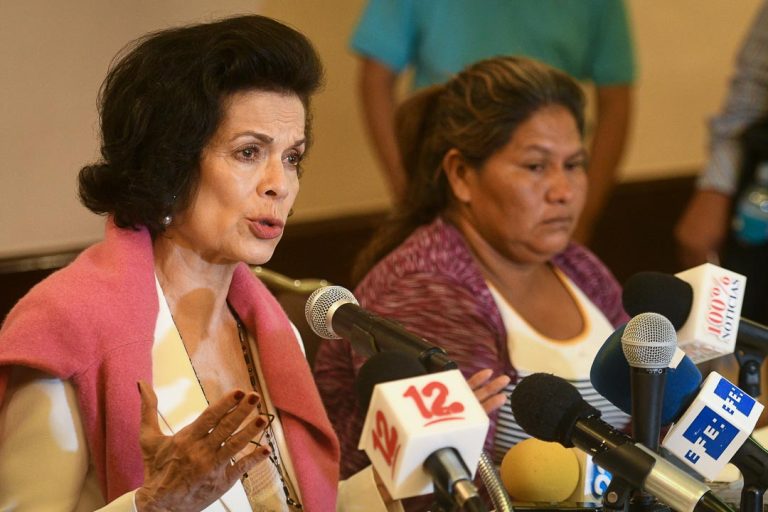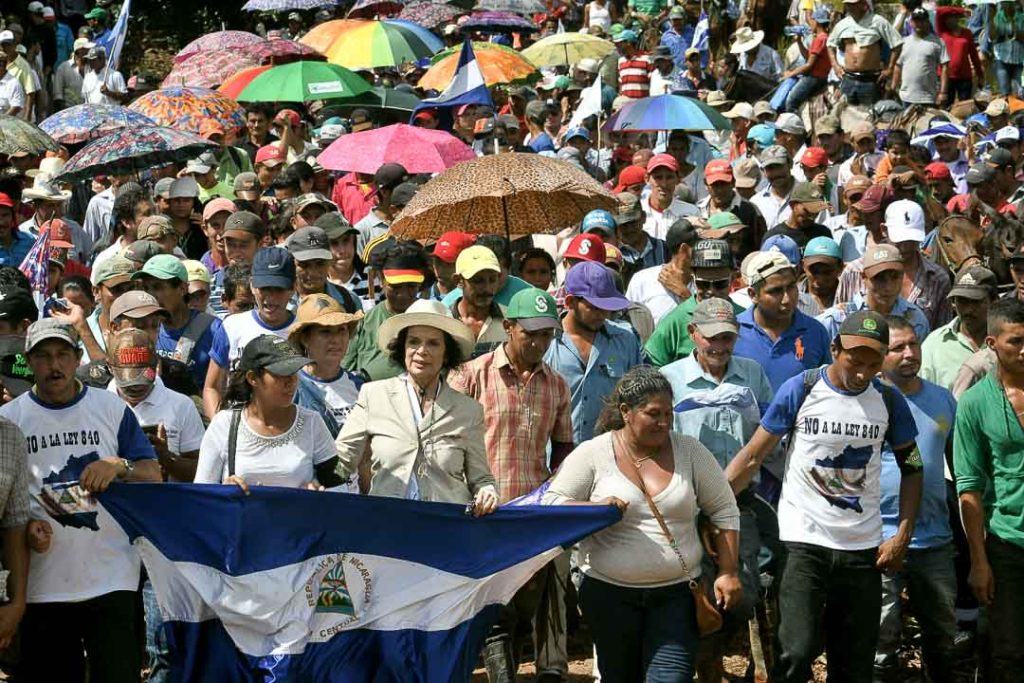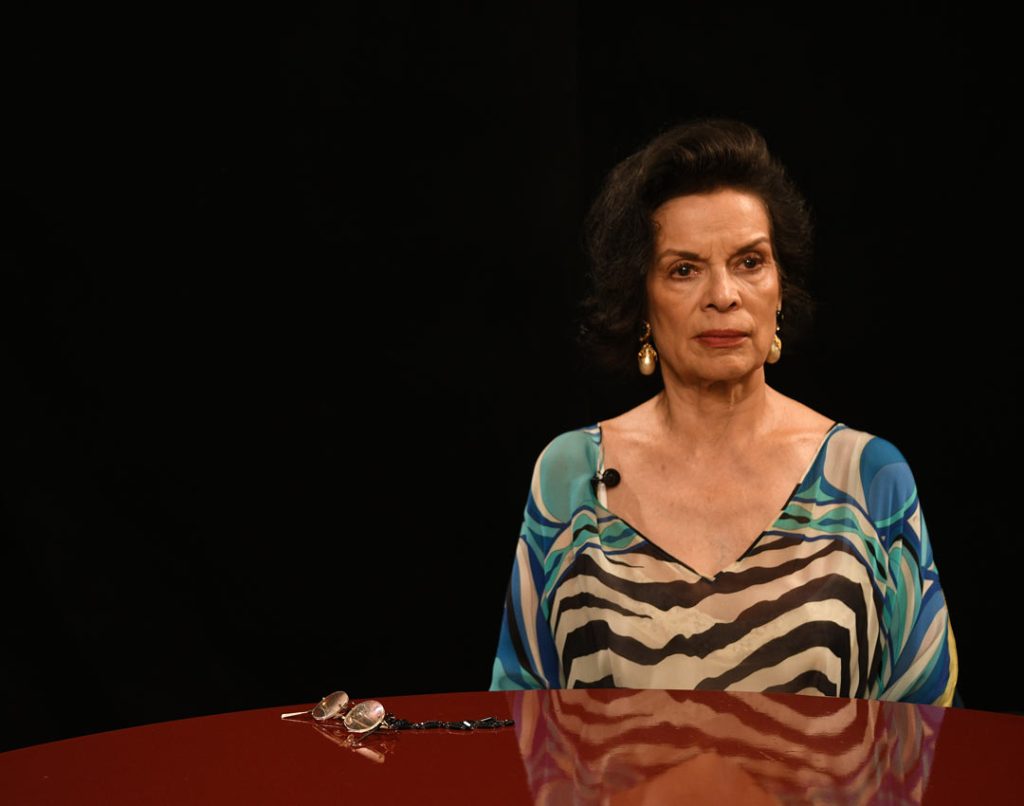27 de agosto 2017

Children of Exile: The Births “Sowing Hope” in the Camp of Nicaraguan Farmers

PUBLICIDAD 1M
PUBLICIDAD 4D
PUBLICIDAD 5D
“The canal isn’t viable; it should never have been considered"

Human Rights activist Bianca Jagger, along with anti-canal movement leader Francisca Ramirez. Photo: Francisca Ramirez
Bianca Jagger attributes Comandante Ortega’s insistence on the disastrous project of an inter-oceanic canal to a “delusion of grandeur” on the part of “a person who wants to remain in power for life.” This delusion won’t allow him to think logically.
Jagger, a native Nicaraguan and international human rights advocate, is based in London where she heads a Foundation that bears her name. She’s convinced that Ortega has made a “mistake in calculation” by ignoring the courage and determination of the rural movement defending their rights as landowners and demanding the repeal of the canal law.
“In Nicaragua, there are powerful people who have sold out and are ready to enter into collusion with the Government; not so with the small farmers,” she affirmed categorically after accompanying Francisca “Chica” Ramirez on the 91st protest march against Law 840.
Jagger, together with Erika Guevara, Director for the Americas of Amnesty International, was in Managua to present the report entitled: “Danger, Rights for Sale: the interoceanic Grand Canal project in Nicaragua and the erosion of human rights.” Among the recommendations of the study, they urge the government of Nicaragua to establish a moratorium on any action related to the canal and its subprojects, and to repeal Law #840.
During her two-week visit, Jagger realized her own on-site investigations in the community of El Tule, part of the San Miguelito municipality in Rio San Juan; in Ometepe on Nicaragua’s Great Lake; and in the community of La Fonseca in Nueva Guinea. Below are some of her conclusions.
Did your visit to the communities along the canal route and the interchange you had with the population of those zones change in any way the conclusions of the Amnesty International report?
No, rather it confirmed everything the report said. The Amnesty International report is very serious, very profound. It was almost a year in the making. For me, as a human rights advocate and as founder and president of the Bianca Jagger Foundation for the Defense of Human Rights, it’s always very important to visit and obtain direct information from the rural residents and indigenous communities; so that they can tell me their stories and the reasons they’re being persecuted. So that’s exactly what I did.

Bianca Jagger (c) alongside Francisca Ramirez in the latest farmers march against the Nicaragua Canal Law. Photo: Carlos Herrera / Confidencial
You were in La Fonseca in the department of Nueva Guinea during protest march #91 of the farmers’ movement that is defending their rights as landowners and demanding the repeal of the canal law. What was your impression of that protest?
One thing is clear: I believe that the interoceanic canal in Nicaragua is a great mistake on the part of Daniel Ortega. He’s making a gross miscalculation, because he’s forgotten about the bravery and the determination of the farm population. The farmers love their lands and are prepared to defend them at any price. That’s what frightens me: I hope that the President will realize how important this is and reflect on it.
We don’t want another war In Nicaragua, we don’t want another conflict. As a Nicaraguan who struggled and who defended the revolution, I implore you, Daniel – don’t continue trying to intimidate the rural communities. They love their land, they love nature, they love the natural resources, and they’re ready to continue their struggle and continue their marches. Even if they go after them, even if they make life impossible for them, they’re going to keep doing this.
And that’s why I went – not only to understand their reality, but also to tell them, “You’re not alone, your struggle is just.” I’m not only going to defend them here in Nicaragua and to talk to all the media, the few independent media that exist in this country, but also, I’m going to continue speaking outside of Nicaragua. I’m going to take the issue to the UN Human Rights Commission in Geneva. I’m going to request an audience before the OAS Inter-American Human Rights Commission. I’m going to write. I’m going to work with Amnesty International so that we can mount a campaign for the repeal of Law 840 in order to put an end to the canal.
Is this megaproject on the radar of the international institutions for the defense of human rights like the ones you mentioned, or of the organizations working to preserve the environment?
At the moment, we don’t see that the international community is focused on what’s happening in Nicaragua, it’s no longer part of the important news of the world. But that fact doesn’t mean we won’t be able to change that perspective. I’ve taken up the situation and conditions of the indigenous people in the Amazon region; those from India; problems in very remote places where people were struggling against powerful mining companies because they wanted to save their mountain or their rivers. It’s possible.
The world has discovered that our natural resources are critical, that if we really want to fight against the earth’s warming we have to preserve these natural resources. That’s my main reason for becoming involved – not only because this Nicaragua is my beloved Nicaragua, the lake of my early years, which I crossed and visited with my mother and father when I was a child. It’s not only for my love, but also for the fact that we shouldn’t let the natural resources, that are the most important part of the developing countries, be exploited. We shouldn’t let them be destroyed, as our president Daniel Ortega wants to do.
You were also in El Tule near the coast of the Great Lake, and on Ometepe. “What are the main concerns of the people there?
The lake is the largest source of potable water for Nicaragua and Central America. There are scientists who have carried out very detailed studies on the damage to the lake that this canal would bring. One simple thing stands out for me, and I’m not an expert: the lake is between nine and eleven meters deep and if they want to construct this hare-brained canal, it would have to be dredged until its thirty to thirty-five meters deep. Where are they going to put all that mud? As Salvador Montenegro* told me, they’re going to create something like the great wall of China, or they’re going to create another island out of mud. Either way, they’re going to contaminate the biodiversity. It’s also going to salinize the waters of the lake, given the difference that exists between the lake and the ocean.
So, if people haven’t yet found out about the potential damage, they need to inform themselves about how this canal is going to affect us. In El Tule, on Ometepe, in La Fonseca, they already know the harm it’s going to cause them and they know how important the lake is.

International investors have looked on this project with curiosity. Some are waiting for the studies to see if it’s worth investing in. But the truth is, four years later there’s no investment, there’s no work underway, there’re no requests out for bids. What level of international credibility does this project have?
It’s clear that the canal isn’t a financially viable project. But that doesn’t mean they’re not going to do it. Because when there are people like Daniel Ortega seems to be – filled with delusions of grandeur, thinking that leaving this canal is his mission, his great legacy – they’re not thinking logically. That’s my biggest concern, because if he were a man who’s thinking objectively about the viability of this project, the project would never even have been considered. But that’s not the case. This is a man who wants to be President for life, wants the power and also wants to say that Nicaragua has the biggest canal in the world.
Four years ago, he said that Nicaragua was on the verge of reaching “the promised land”. At that same time, his minister Paul Oquist predicted that by this year, 2017, Nicaragua would have seen 15% economic growth, and 50,000 direct jobs plus half a million indirect jobs generated by the canal.
This all indicates that he believes his own lies. I saw that video where he says: “the day has already arrived; the hour of the promised land has already arrived.” No, Mr. President, the hour of the promised land hasn’t arrived. The promised land you want are the lands belonging to the farmers, and no, it won’t come to be. Those lands belong to the rural residents, and they’re not going to allow them to become your promised land.
You spoke of resistance to megaprojects in other countries like Brazil and India. Can you get a law such as this repealed through the lone struggle of a rural movement, although it has the backing of a very strong authoritarian government?
When I left Nicaragua, I thought that Somoza could never be defeated, and when I went off to study Political Science with a scholarship from the French government, it’s because I thought there was no hope of Nicaragua changing. Everything can change. Our president should remember as the Sandinista leader he once was, that the people can wake up, that one day the lies don’t sound real. Perhaps it seems that the rural residents have been forgotten, that they’re waging their peaceful struggle against that canal alone, but he should remember that one day the Nicaraguans could wake up and get behind them. May it happen like that!
Is this a personal cause for you as a Nicaraguan, or is it under the banner of your foundation in defense of human rights?
It’s a cause of the Foundation that I believe in, but it’s also a cause for me as a Nicaraguan. If I am fighting in so many countries for the rural people, for the indigenous peoples, for the communities, how could I not fight for those in Nicaragua? But it’s also a personal struggle, because those are our natural resources, our patrimony. It’s our lake, and Nicaragua would never be the same. I’m going to speak with the European community and with other countries where I have a relationship with the governments so they can help us.
I’m not talking about the United States, and in no way am I saying that I want foreign intervention. You know very well that I’m against any foreign intervention in any country, even in very grave situations. But, yes, I’m going to ally myself with Amnesty International in all of their efforts to demand that they repeal this law and also, as a Nicaraguan I ask that they immediately halt this project.
Have you had any contact with the Chinese company, or with representatives of Wang Jing, or with the Nicaraguan government authorities to converse and put forward these points of view about the project?
No. I’d very much like to have an audience with the Nicaraguan government authorities. I haven’t had any interviews with the Chinese investors, but yes, I’m willing. The way I worked on many of those projects in India was by participating in the meetings of the chief stockholders. I also held interviews with the owners or directors of the companies involved. I’m ready to sit down with anyone – with the government, with our honorable president, with the Chinese, with whomever – to hold a dialogue. I believe in such dialogue, and I think that it’s important that we avoid at any price having an armed conflict in this country.
How do you view the resistance of the movement you encountered, of doña Francisca “Chica” Ramirez, and the leaders in El Tule and in Ometepe? There are people who say: “They’re going to be bought, they’re going to be coopted, and the government has enough resources to tell this rural movement: the canal’s going to happen, so just forget this pressuring.”
I don’t believe it. My impression is that the farmers in Nicaragua don’t sell out. The rural people in Nicaragua are courageous. There are a lot of powerful people that have sold out, who are ready to enter into collusion with the government. Not so the farmers. The farmers are independent, and one of the things that Ms. Chica Ramirez said all the time I was with her on the march is: “We accept people who come from any party, from any religion, from wherever they want to come from. We don’t put any obstacles in their way. We don’t ask them to become part of this thing or the other. The only thing is that they fight for their lands and that they fight against Law 840”. And I don’t believe that the rural people are for sale.
When the Amnesty International study was presented two weeks ago, you said you hoped that ComandanteOrtega would respond to these demands from the farmers, and stop the repression. Since then, nothing has happened. Does the government have the capacity to rectify their mistakes?
Daniel Ortega knows what a rural revolt signifies. He also knows that there’s a movement there, a peaceful resistance. If he has any remnants left of what he used to be, when he was a combatant for the Sandinista revolution, he should think again about this project. He should have some communication or a dialogue with the rural people and find out why those people who are opposing this canal are opposing it so passionately. If he wants to maintain himself in power, he has to reconsider, because this is the project that’s going to bring him to his end.
Translated by Habana Times
Archivado como:
PUBLICIDAD 3M
Periodista nicaragüense, exiliado en Costa Rica. Fundador y director de Confidencial y Esta Semana. Miembro del Consejo Rector de la Fundación Gabo. Ha sido Knight Fellow en la Universidad de Stanford (1997-1998) y profesor visitante en la Maestría de Periodismo de la Universidad de Berkeley, California (1998-1999). En mayo 2009, obtuvo el Premio a la Libertad de Expresión en Iberoamérica, de Casa América Cataluña (España). En octubre de 2010 recibió el Premio Maria Moors Cabot de la Escuela de Periodismo de la Universidad de Columbia en Nueva York. En 2021 obtuvo el Premio Ortega y Gasset por su trayectoria periodística.
PUBLICIDAD 3D